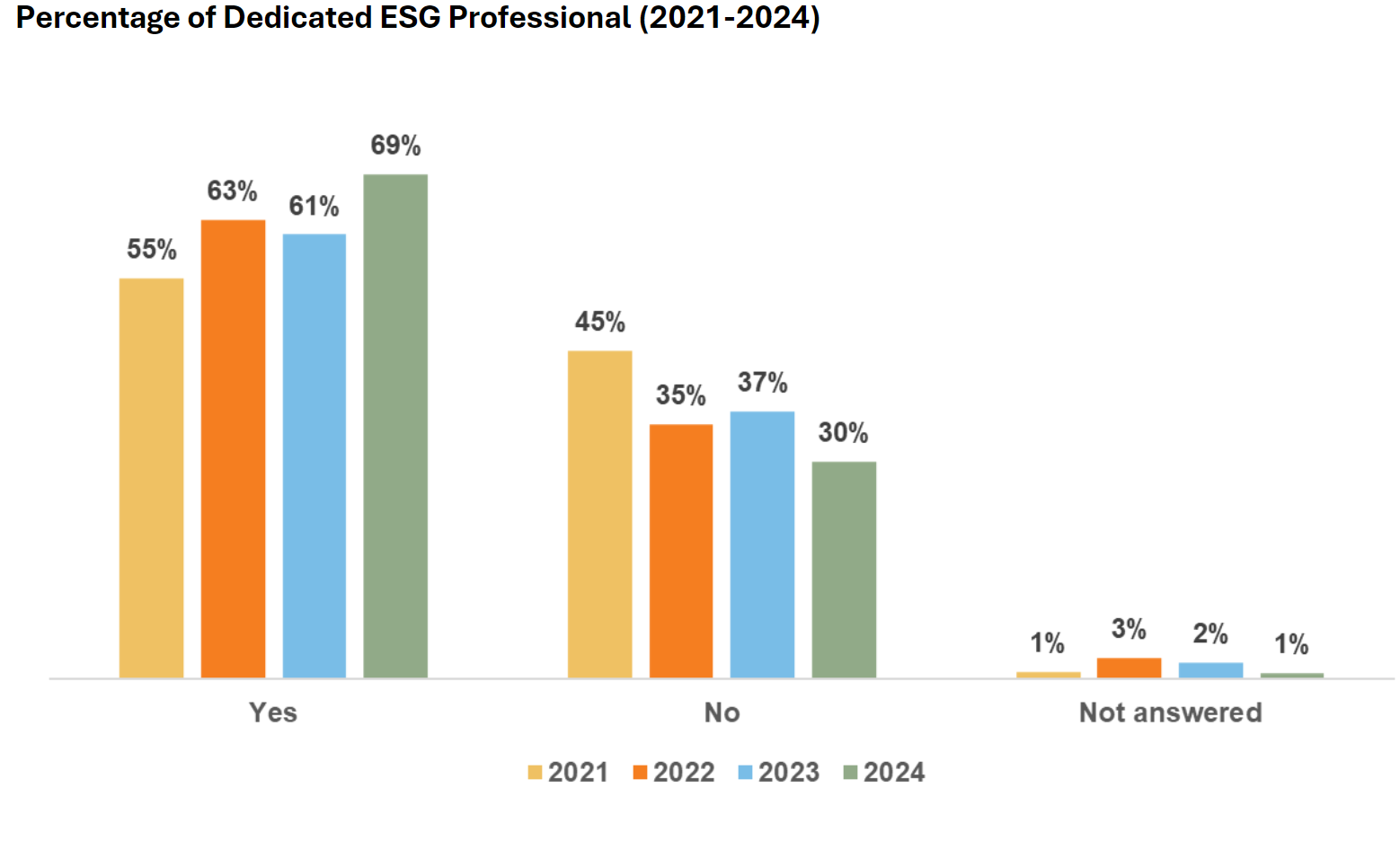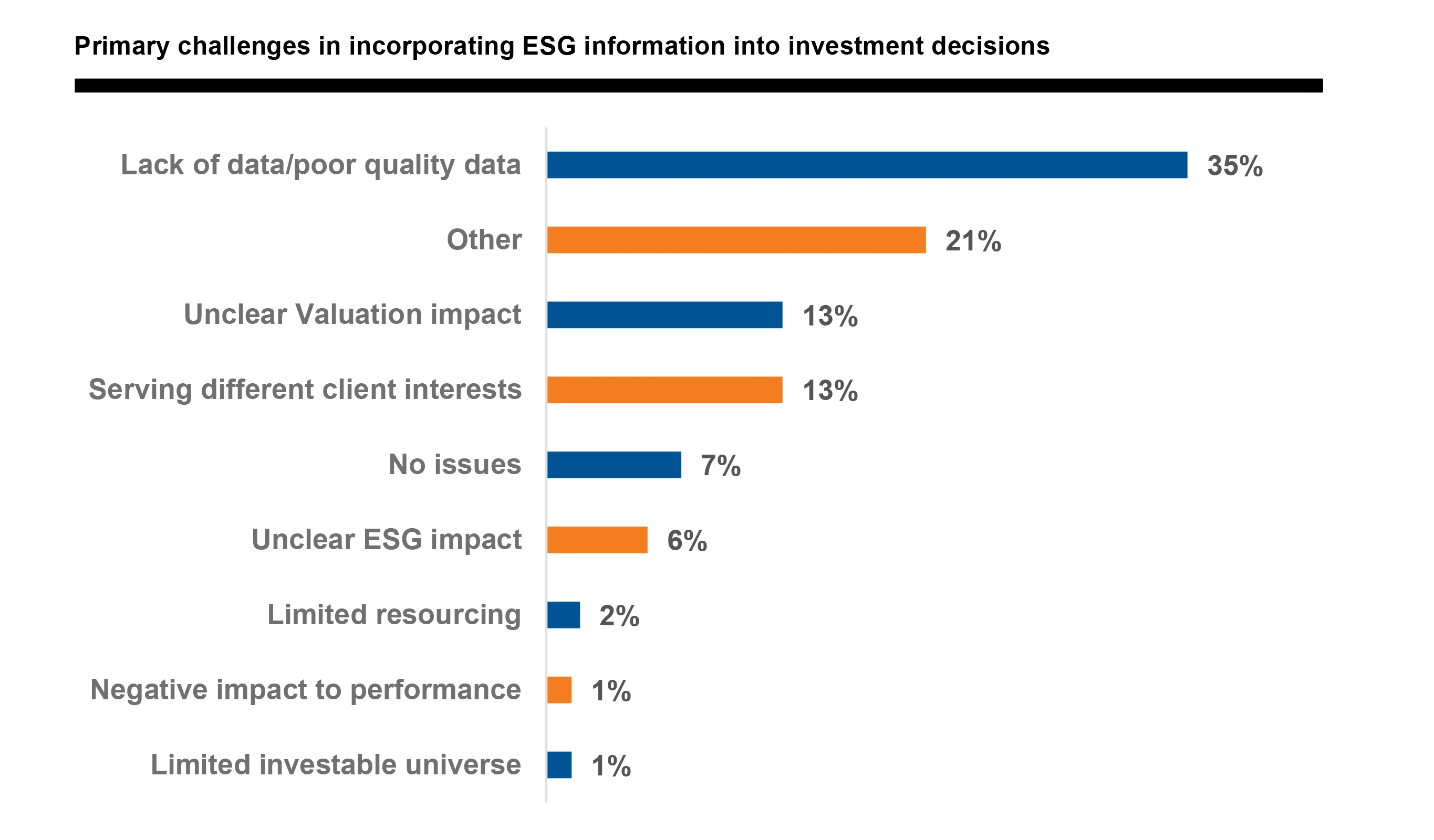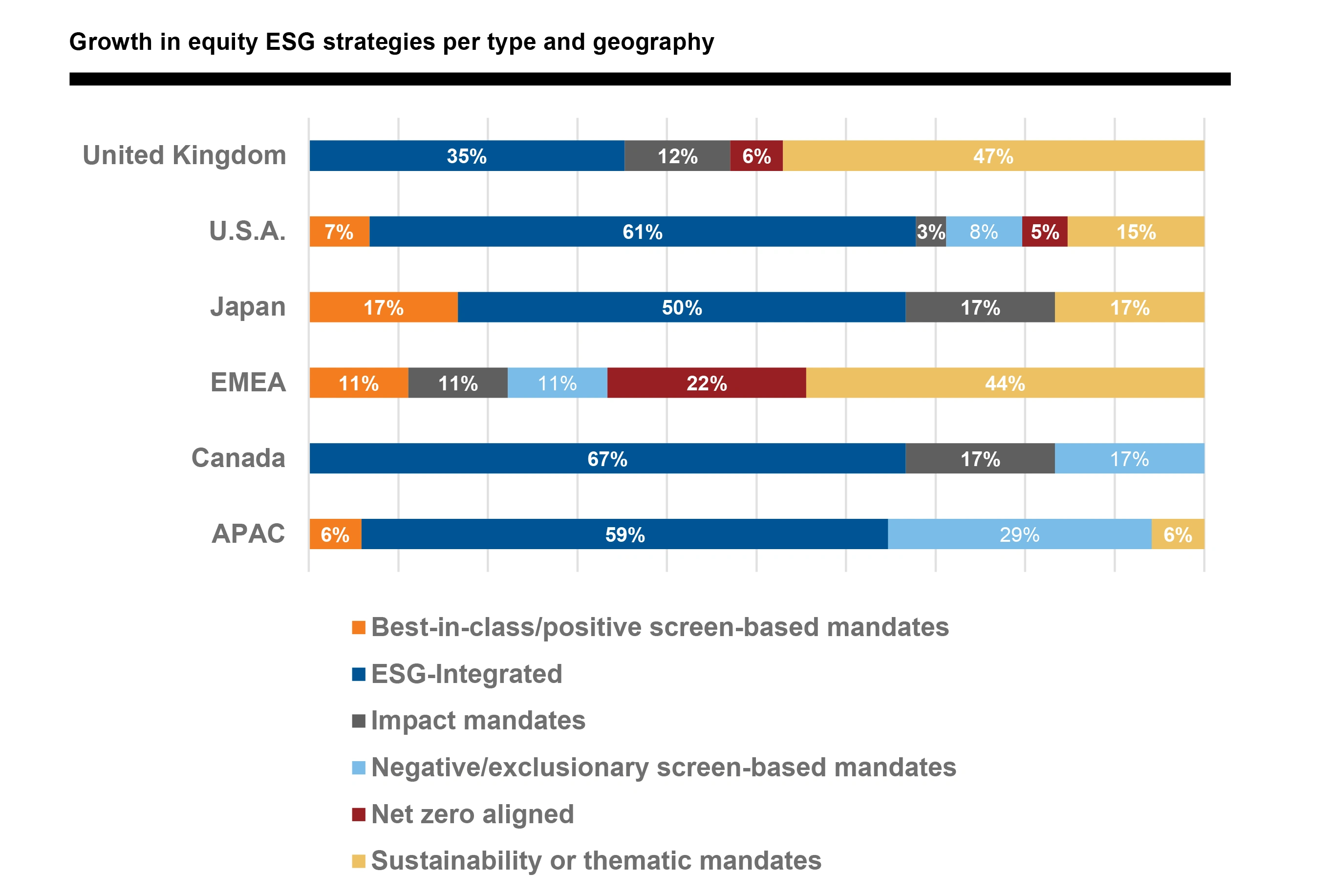10th Annual ESG Survey: Rising trends
The 10th Annual ESG Manager Survey offers a deep dive into the global trends shaping sustainable investing. By gathering insights from investment managers across the globe, this survey has become a critical tool for understanding the evolving landscape of ESG (Environmental, Social, Governance) investing. These insights not only inform our due diligence efforts but also form a guide by which we promote best practices in sustainable investing.
Respondent breakdown
This year, nearly 225 investment managers participated in the survey, representing a broadly diversified portfolio of asset classes and markets. The survey also captured responses across both large and small asset managers, with 33% managing more than $100b in assets and 31% managing less than $10b. Notably, managers were split almost evenly between the U.S. and international domiciles, with 23% based in the EMEA region and 13% from APAC. Equity solutions were offered by 80% of respondents, while 52% provided fixed income solutions, and 26% managed listed real assets. One notable difference in 2024 was greater private markets representation, with 44% of respondents offering unlisted products—an area receiving increased attention from investors.
Source: Russell Investments ESG survey 2024
In this first blog, we explore how ESG commitments and solutions offerings are evolving among investment managers.
Expanding ESG commitments amid political pressures
Despite political and legal challenges in the United States, investment managers have maintained—and in many cases, expanded—their ESG commitments. Notably, 87% of survey respondents remain committed to the UN Principles for Responsible Investment (UNPRI), extending its status as the gold standard for sustainable investing.
Adoption of the Task Force on Climate-Related Financial Disclosures (TCFD) framework grew to 59%, a slight increase from last year. This figure is expected to rise further as more countries, led by the UK, begin mandating TCFD reporting. Regional and sector-specific frameworks, such as the Institutional Investors Group on Climate Change (IIGCC) in Europe and the Global Real Estate Sustainability Benchmark (GRESB), also maintain strong relevance amongst managers responding to our survey.
There was a notable dip in indicated support for Climate Action 100+, as our survey reflects the announced departures of several U.S.-based and fixed income-focused asset managers.
Source: Russell Investments ESG survey 2024
ESG hiring holds steady in 2024
While the hiring boom for ESG professionals has slowed, investment managers are still adding ESG specialists across various roles. In 2024, 75% of respondents reported increasing their dedicated ESG headcount, particularly within sustainability teams. This brings the proportion of firms with dedicated ESG staff to 69%, up from 55% in 2021, and it underscores the rising significance of ESG expertise in shaping investment decisions.
Source: Russell Investments ESG survey 2024
Beyond sustainability, ESG roles are increasingly spanning data analytics, compliance, risk management, and legal departments. This trend underscores the mainstream nature of ESG-aware investing, as regulatory requirements and client expectations continue to evolve.
Source: Russell Investments ESG survey 2024
Financial materiality
Very few concepts in our survey receive near universal agreement, but the most notable and steady shift in opinion has occurred in response to a question about when ESG factors affect investment decisions. In 2024, only 3% of respondents indicated "ESG factors do not drive investment decisions", a sharp decline from 28% in 2020.
Source: Russell Investments ESG survey 2024
At the same time, investment managers have increasingly recognized the materiality of governance, environmental, and social concerns. Risk reduction remains the primary driver of ESG-informed investment decisions, cited by 27% of respondents, while 19% indicated that ESG factors can enhance returns.
Hurdles to integration
Despite progress, challenges remain in incorporating ESG information into investment processes. Reflecting ongoing issues with data availability and standardization, "lack of data/poor quality data" emerged as the top obstacle this year after it was added as a new answer choice. Unclear valuation impact and serving varied client interests were also commonly cited.
Interestingly, concerns about ESG's negative impact on performance and a limited investable universe, which were more prominent in past surveys, were only raised by 1% of respondents in 2024. This suggests growing confidence in the financial benefits of ESG integration.
Source: Russell Investments ESG survey 2024
Emerging ESG strategies
When asked about the types of products experiencing the most growth, 36% of respondents indicated "not applicable," which may reflect recent industry-wide outflows in ESG product assets under management (AUM). However, among those who reported growth, ESG-integrated solutions were the most popular, with 27% citing demand in this area.
For the first time, the survey asked managers about their thematic and impact strategies. While 33% of firms do not currently offer impact products, those that do have embraced a range of themes, including alignment with the UN Sustainable Development Goals (SDGs), energy transition, and social impact initiatives.
Source: Russell Investments ESG survey 2024
Products trends
We asked firms about the equity ESG products generating the most interest and asset growth over the past year, and the results are clear: ESG-Integrated mandates are the frontrunners globally, with up to 67% of respondents in EMEA, Canada, APAC, and the U.S. favoring these strategies.
However, regional differences emerge. In EMEA (44%) and the U.K. (47%), Sustainability and Thematic mandates are gaining traction, highlighting a focus on specific issues like climate change and social responsibility. Net Zero-Aligned mandates remain niche, with 22% interest in EMEA but only 5% in the U.S. and 6% in the U.K., indicating a regional focus on net-zero goals.
Finally, Negative/Exclusionary Screen-Based Mandates are popular in China (67%), while Australia/New Zealand and Continental Europe show similar preferences. In contrast, the U.S. and U.K. lean more toward positive screening and integration strategies.
http://Source: Russell Investments ESG survey 2024
Looking forward
As ESG investing continues to evolve, this survey highlights the resilience of investment managers in maintaining and expanding their sustainable investing capabilities and solutions. The rise of thematic and impact investing, alongside the financial materiality of ESG information, points to a future where sustainability and profitability go hand in hand.
Stay tuned for the next blog in our series, where we will explore how investment managers are engaging with Active Ownership.
Download the full reportAny opinion expressed is that of Russell Investments, is not a statement of fact, is subject to change and does not constitute investment advice.






